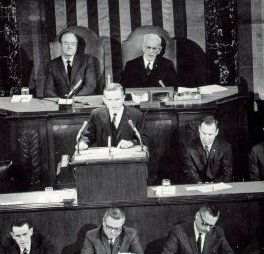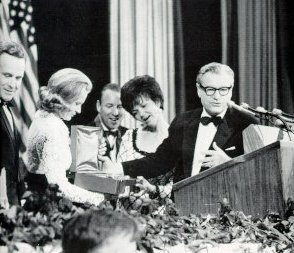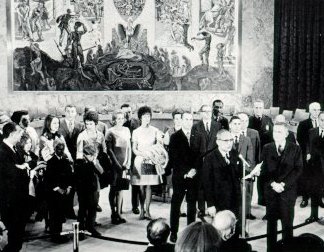
A LUNAR CHRISTMAS
"At some point in the history of the world", editorialized The Washington Post, "someone may have read the first ten verses of the Book of Genesis under conditions that gave them greater meaning than they had on Christmas Eve. But it seems unlikely ... This Christmas will always be remembered as the lunar one."The New York Times, which called Apollo 8 "the most fantastic voyage of all times", said on December 26: "There was more than narrow religious significance in the emotional high point of their fantastic odyssey."
As Apollo 8 began its tenth and last orbit, CapCom Ken Mattingly told the astronauts: "We have reviewed all your systems. You have a GO to TEI" (trans-earth injection). This time the crew really was in thrall to the SPS engine. It had to ignite in this most apprehensive moment of the mission, else Apollo 8 would be left in lunar orbit, its passengers' lives measured by the length of their oxygen supply. Ignite it did, in a 303-second burn that would effect touchdown in just under 58 hours. Apollo 8 reentered at 25,000 mph and splashed down south of Hawaii two days after Christmas.
The stupendous effect of Apollo 8 was strengthened by color photographs published after the return. Not only was the technology of going to the Moon brilliantly proven; men began to view the Earth as "small and blue and beautiful in that eternal silence", as Archibald MacLeish put it, and to realize as never before that their planet was worth working to save. The concept that Earth was itself a kind of spacecraft needing attention to its habitability spread more widely than ever.
During the last week of 1968 the Associated Press repolled its 1278 newspaper editors, who overwhelmingly voted Apollo 8 the story of the year. Time discarded "The Dissenter" in favor of Borman, Lovell, and Anders; and a friend telegraphed Frank Borman, "You have bailed out 1968."

| A joint session of Congress convened to hear the first men to fly around the Moon. That's Borman at the Speaker's rostrum with Lovell and Anders wearing expressions of somber dignity. Public appearances were a demanding part of the job. |

| On a six-city tour, the Apollo 8 astronauts and their wives received a warm welcome and round of tributes. Here New York Governor Nelson Rockefeller is presenting them with a commemorative Steuben glassware plate titled "The Mountains of the Moon". |

| In the United Nations, Secretary General U Thant introduced the astronauts and their families to meimbers assembled in the Security Council chambers. No simulations in Houston nor the Cape had prepared them for this kind of public attention. |
| Next |